Imagine being on a journey to discover a musical treasure, a journey that takes you through the vibrant landscapes of sound and harmony. And finally, you stumble upon a unique instrument that unleashed new realms of tones you never thought existed – the Gretsch resonator acoustic guitar. That’s how my musical story was forever changed. This tale is incomplete though. You may wonder, what happened next? What magic did those guitars weave? For those answers, let’s dive deeper.
These are not just any guitars, they are Gretsch resonator guitars, the epitome of rich acoustic expression and iconic blues era sounds. As a fingerstyle guitarist, their alluring timbre has not only enchanted me but drove me to comprehend their distinct character and unrivaled appeal. Now, this guide aims to share my years of fascination, exploration, and understanding of these guitars with you.
We’ll delve into various aspects, from the nuanced acoustic resonator tone to the distinctive features that make Gretsch resonator guitars stand apart. Furthermore, I’ll walk you through the differences between various models, guiding you on your path to discovering your perfect resonance. Are Gretsch’s resonator guitars the unsung heroes of the guitar world? I argue they might be, and by the end of this guide, you might agree.
Let’s embark on this journey together, and by the end, I hope you’ll share my profound appreciation for these instruments and the unique tone they have to offer.
Gretsch Resonator Acoustic Guitars: Understanding the Basics
Origin and Evolution
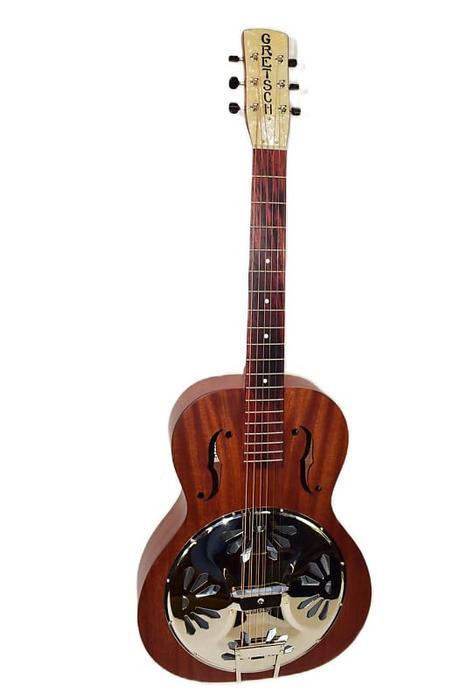
As we dive deeper into Gretsch’s resonator guitars, we must appreciate their rich journey, which began decades ago. The roots of these versatile instruments can be traced back to the ‘Roots Collection’ guitars, a classic series that truly encapsulated the spirit of Gretsch. These guitars were a tribute to the golden era of American music; the resonating sounds reflecting the very evolution of our musical landscape.
Over the years, Gretsch has refined and crafted these resonator guitars, each epoch infusing a new charm and character into them. My explorations of various musical genres have given me an insatiable desire to dive deeper into understanding these guitars. Each evolution represents a new chapter of craftsmanship, seamlessly blending tradition with innovation.
Undeniably, understanding the origin and evolution of Gretsch resonator acoustic guitars is as enriching as strumming their strings. This enlightens us about not just the instrument designing technology with time, but also the ever-evolving musical culture.
Stick around as we unfold the distinct features that make these guitars timeless artefacts of music. It’s not just the sounds but the intricate detailing that contributes to their grandeur.
Distinctive Features
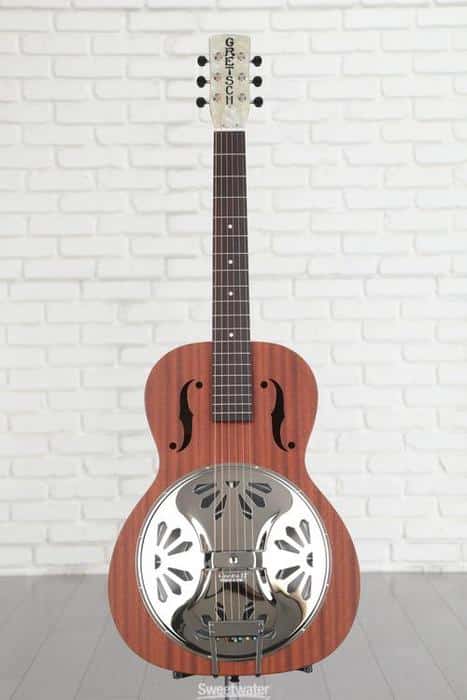
As an ardent guitarist and a devoted enthusiast of Gretsch Resonator Acoustic Guitars, I feel there’s something incredibly distinctive about their tonal texture and acoustic resonance. Owning and performing with various types, be it the Mahogany body resonator or the Steel body resonator guitar, has familiarized me with the unique sonic essence each resonator type brings forth. So, allow me to walk you through some of their key features.
Mahogany body resonator guitars are favored for their warm, rich, and full-bodied tone. The mahogany wood imparts a mellow timbre that is loved by blues and folk musicians who crave for a more round, bass-heavy sound. Transitioning to the Steel body resonator guitars, the soundscape shifts. Here, the tones are sharper, more resonant, with an emphasized midrange that cuts through ensembles like a hot knife through butter. This makes it an excellent choice for bluegrass and folk musicians who need to stand out in a band setup.
At the core of these distinct tonal personalities is the Ampli-Sonic diaphragm – a revolutionary feature synonymous with Gretsch guitars. This hand-spun diaphragm, often paired with an Eastern European resonator cone, exhibits an impressive sonic projection and tonal clarity that is unmatched.
As I reflect upon my journey with these stunning guitars, I am reminded of the distinctive tonal landscapes they have allowed me to explore. In our next section, we will delve deeper into playing techniques and how they interact with these unique features to further accentuate the exceptional character of Gretsch Resonator Acoustic Guitars.
Playing Techniques and Music Genres
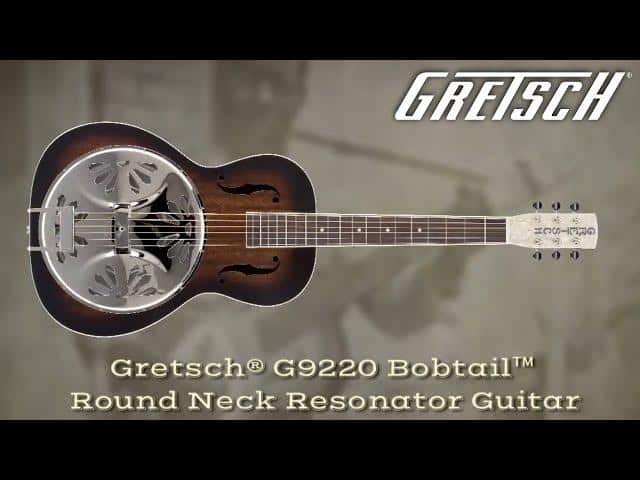
As a seasoned musician with ample experience of performing with Gretsch resonator acoustic guitars, I’ve been endowed with a deep appreciation of their versatility. The rich, distinctive tones and unparalleled projection of these guitars make them a favorite choice across music genres, particularly in blues and folk music. Resonator guitar playing techniques distinctly shape the music they produce, endowing it with a unique character.
When it comes to traditional blues music, resonator guitars are practically synonymous with the genre. The slide technique – which involves moving a glass or metal slide up and down the strings – generates haunting bottleneck sounds, lifelike echoes of human voices, the cornerstone of blues. Artistic use of picking techniques further enhances these effects, shaping the emotion-laden, raw sound exclusive to blues.
Resonator guitars in folk music have a different narrative. This genre often utilizes fingerpicking and strumming techniques, delivering a crisp, bright tone that’s well-suited to the storytelling nature of folk songs. Along with the slide technique, these styles pull a depth and resonance from the guitar, broadening its scope to accommodate the whimsical and playful rhythms of folk music.
Nurturing an understanding of these playing techniques is pivotal in exploiting a Gretsch resonator guitar to its full capacity. By mastering these diverse techniques, you immerse yourself into the authentic blues and folk soundscapes, unlocking the ability to express an array of emotions through your music.
The musical journey with a Gretsch resonator guitar is truly a transformative experience. As we move forward in the intricacies of this guide, let’s remember that these guitars are adaptable and capable of bringing your musical ideas into a tangible, sonorous reality.
Comparing Gretsch Resonator Guitar Models
Comparison by Construction and Tone
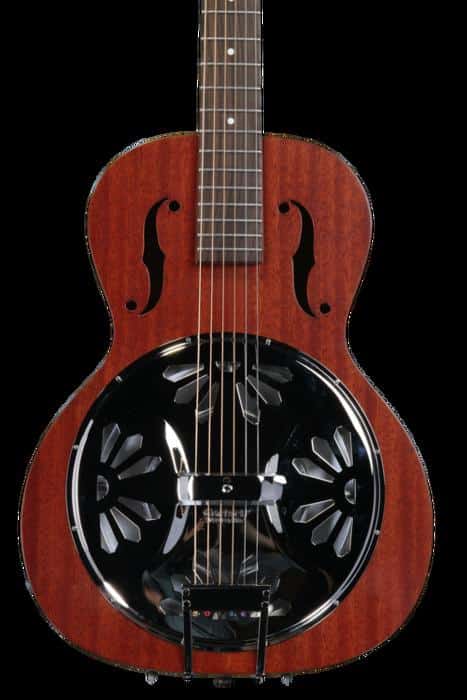
Delving deeper into our comparison of Gretsch resonator guitars, the construction dimensions and tonal characteristics are pivotal elements that shape each model’s unique sound. It’s not just about aesthetics; it’s these subtleties that contribute to the overall resonance and tonal richness of your chosen instrument.
In examining construction, we must talk about the hand-spun resonator cone. Gretsch is renowned for its impeccable craftsmanship, and the resonator cone is no exception. An integral component, this hand-spun resonator cone acts as a primary sound generator and significantly influences the guitar’s overall tonal landscapes. Handcrafted in its manufacturing, the precision and care invested in the construction of each cone can be appreciated in the outstanding sound it helps achieve.
Exploring the tonal aspect further, the inner workings of Gretsch guitars play a vital role in shaping the distinctive resonator guitar sound. Whether you’re looking for a sharp, biting tone for your blues licks or a warm, rich sound that carries across a room, Gretsch offers a range of tonal characteristics that cater to these variations and beyond.
Every detail, from the cone to the body materials, impacts the guitar’s sound. I’m here to help you decode these nuances so that you can make an informed choice. Whether you prefer the full-bodied resonance of mahogany or the bright, crisp tone offered by the sparkly biscuit bridge, understanding the connection between construction and tone will ensure you find a Gretsch resonator guitar that sings in harmony with your musical ambitions.
Recognizing the importance of these factors, let’s move onto the specific series and how they differ in our next section, ‘Comparison by Guitar Series’. With knowledge of their construction and tone, we will have a better understanding of each series’ distinctive sound and musical purposes.
Comparison by Guitar Series
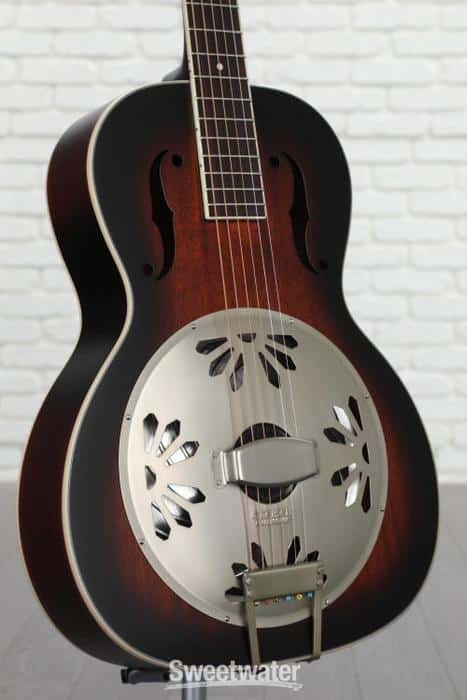
In my own musical journey, I’ve spent countless hours immersed in the enchanting world of Gretsch Resonator Acoustic Guitars. Through hands-on experience, I’ve learned how instruments from the same model can sing different tales across series. Here, the subtleties take centre stage, interacting with your hands, dancing with your fingers, breathing out stories especially unique to the series they belong to. Like the distinct flows in symphonies, let’s help you find the right fit in this harmonized world.
As we begin this intriguing journey, the interaction between the Round-neck and Square-neck resonator guitars becomes apparent. My intimate exploration with the Square-neck series revealed their affinity towards a more hearty, full-bodied sound, perfect for my bouts of Bluegrass. These guitars, meant to be played on your lap, have a wider string action compared to their counterparts, resonating a deep, rich tone.
On the flip side, Round-neck series resonators subtly whisper their presence. Their charm lies in their versatility. Whether you love strumming blues, picking country melodies, or sliding on rock-n-roll tunes, they accommodate them all with equal ease. In my encounters, the Round-neck series’ slender neck assists dynamic finger fretting, emitting a whirling, vibrant sound—echoing life in every chord.
Each series is a unique protagonist in the resonator family, offering subtle yet enriching variations in tone, texture, and handling. They have complimented my pallet of playing styles, worth their transit from Gretsch’s historic factory straight to my passionate heart.
Understanding the resonator’s construction is just half the puzzle. To completely immerse yourself in their symphonies, understanding different series’ nuances could be the missing piece to your perfect selection. As we move along this melodic maze, let’s dive deeper into the subtler aspects to guide you to an informed choice, one that fits well with your fingers, speaks your musical language, and sings your soulful stories.
This enriching comparison of Gretsch Resonator Guitar Models continues our journey to understand their deeper personas. Nevertheless, my expert insights and your specific needs culminate in a personalized selection process—augmented in the following sections with a reliable buying guide and honest reviews from fellow musicians.
Buying Guide and Reviews
What to Consider When Buying
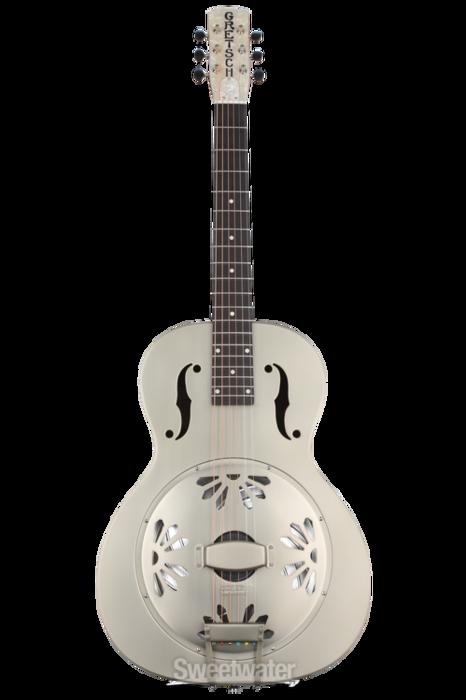
When discussing the essential characteristics to evaluate during the acquisition of a resonator guitar, certain indicators of quality might not be apparent to the untrained eye. As a seasoned player, let me guide you through these critical points of consideration.
Resonator guitar strings play a vital role in producing the unique sound associated with this instrument. Look for strings made from brass or nickel, as they confer a richer, more vibrant tone quality compared to other materials.
Buying a resonator guitar is not just about good strings, though. As with any guitar, the quality of build and materials used is fundamental. For Gretsch Resonator Guitars distinctly, pay attention to the choice of wood, the nuances in the cone design and craftsmanship, and how that will affect the resonance and overall sound. Every detail matters when it’s about balancing your personal preferences with the best possible tonal production. You must also consider the guitar’s action and how well it fits your playing style.
Lastly, remember that while a resonator guitar is a substantial investment, the correlation between price and quality is not always direct. A lower-priced guitar might suit your needs better than a high-end model, based on your skill level, playing intent and budget. It is the nuances picked up from long-term use and substantial experience that make these points significant to contemplate.
Moving on to the comparative section, you will get a detailed overview of different Gretsch models. Yet, bear these considerations in mind as we compare the variations in construction, tone, and series-specific features. This expertise will guide you in your buying process to ensure your final choice aligns perfectly with your musical desires.
Honest Reviews from Guitar Forums
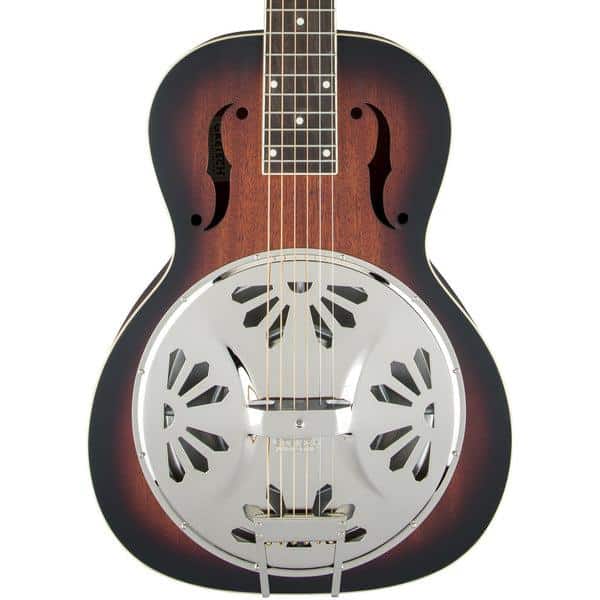
Now that we’ve extensively delved into the specifications, let’s broaden our horizons by discussing some real-world resonator guitar reviews. For transparency, what better sources are there than unbiased, informed opinions from avid guitarists on forums, where enthusiasts congregate to share insights and experiences?
Through my long-standing work with Acoustic Guitar magazine and Peghead Nation, I’ve been an active participant in countless guitar forums, gleaning valuable perspectives that can only arise from passionate engagement with the instrument. With this accumulated knowledge, let’s navigate through some truthful reviews from these communities.
In the resonator guitar pantheon, Gretsch resonators consistently won high praises for their sturdy build and outstanding tonality. Not just for beginners, these instruments are revered by professionals as well for their reproductions of the classic resonator sound.
‘Gretsch Bobtail,’ one of their popular models, was praised as a versatile performer, equally adept at fingerpicking blues or cranking out full-throated country twang. However, a few reviews flagged ‘G9200 Boxcar’ as a slightly heavier model, potentially impacting playability for some users.
It’s important to remember everyone’s guitar journey is different, colored by unique preferences and experiences. Honest commentary like these helps paint a holistic, grassroots-level picture about the guitars, vital for an informed decision.
When factoring in resonator guitar reviews amidst your choice, bear these concrete experiences in mind. Together with the practical buying guide, they can help you align expectations and ensure you pick the Gretsch resonator that strikes the perfect harmony.
Coming up next, we’ll delve into Frequently Asked Questions to further enrich your understanding about Gretsch Resonator Acoustic Guitars. Remember, the goal is to arm you with all necessary knowledge for your quest for the perfect guitar!
FAQs
What makes Gretsch Resonator Acoustic Guitars unique?
How does Gretsch’s Resonator compare to other brands?
What factors should one consider when buying a Gretsch Resonator Acoustic Guitar?
Conclusion
In wrapping up, it’s important to realize that Gretsch resonator guitars aren’t just instruments—they truly are an experience. Each has its unique voice, representing a perfect blend of history, craftsmanship, and auditory brilliance. Therein lies the beauty and profound appeal, making your playing experience deeply personal and gratifying.
Gretsch Resonator Guitars: They’re not just instruments; they are an experience. Ready to find yours?
Holistically speaking, understanding these guitars—ranging from their distinctive features to construction and tone variations—can profoundly influence your buying decision. Ultimately, it brings you closer to finding that resonating soulful ‘voice’ in a guitar you’ve been searching for.
Whether you’re a seasoned musician or a passionate beginner, I sincerely hope that this guide brings you one step closer to discovering your perfect Gretsch resonator. As I have journeyed through my own experiences, writing and playing various guitars, I’ve realized the importance of finding the instrument which truly resonates with us. The search may require time and patience, yet in the end, the harmony you will find is beyond rewarding.
Thus, unfold your music journey and let your unique voice reverberate vibrantly through the strings of your Gretsch resonator guitar. Embrace and cherish these guitars—they’re more than just an instrument, they’re an experience waiting to become a part of your musical legacy.
Verbose. I am trying to find out when Gretsch stopped making square-neck resonators in USA, if ever. I want USA made square-necked resonator.